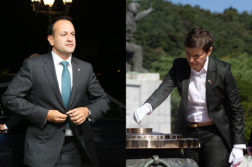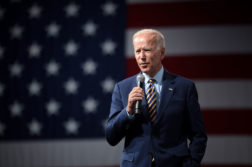The Abbott government has backed a motion calling on Indonesia to dismantle its media ban in West Papua, home to widespread allegations of human rights abuses, but there is doubt this will signal any further change to Australia’s policy.
It is notoriously difficult for foreign journalists to gain access to the province, which has been under Indonesian control since the late 60s. Many foreign reporters enter the country on tourist visas, running the risk of deportation or jail.
The media ban and the reported intimidation of local journalists and sources has meant recurring allegations of human rights violations against the ethnically Melanesian Indigenous population are largely left off the international radar.
Earlier this year, two French journalists were arrested whilst filming a documentary, allegedly in the company of armed separatists.
The journalists – Thomas Dandois and Valentine Bourrat from the French Arte channel – have been jailed without charge since August 6. There are concerns they will be charged with espionage, but formal charges will not be laid until they are brought before court.
A local fixer was arrested with the two, and there are concerns over the safety of local people who came into contact with them.
Mr Dandois and Ms Bourrat’s incarceration has been condemned by West Papuan activists, and the subject of protests around the world, but their case has failed to make headlines like that of Australian journalist Peter Greste, who was sentenced to seven years jail in Egypt.
Yesterday the Senate passed a motion proposed by Greens Senator Richard Di Natale calling on the Australian government to request the release of Ms Bourrat and Mr Dandois.
The motion passed following technical amendments from foreign minister Julie Bishop’s office.
“This motion goes to two specific issues,” Senator Di Natale told the upper house.
“One is the issue of journalism and journalism right around the world being under attack. We have recently seen the issue of the Australian journalist Peter Greste incarcerated in Egypt after a show trial but we cannot advocate for people like Peter Greste and stay silent on the issue of the arbitrary detention of journalists in West Papua like the two French journalists who were doing nothing wrong other than reporting the truth.”
Senator Di Natale told New Matilda it was a “huge shock” that the government had decided to back the motion. It had first gone to the Prime Minister’s office where there seemed to be “very active consideration of it”.
Senator Di Natale said there were a few technical amendments from Foreign Affairs minister Julie Bishop’s office.
“I had no expectation this government would support it so it was a big surprise…. This is the first time in my experience that any motion on the topic of West Papua has passed. And what makes it more interesting is that the motion calls on the Australian government to raise the issue with Indonesia,” Senator Di Natale told New Matilda.
“So effectively it’s supporting a motion calling on itself to discuss this issue either currently or is planning to engage in discussions with the new President.”
The Gillard government’s foreign affairs minister Bob Carr made several strong statements confirming Australia’s support of Indonesian sovereignty over the region whilst in government. In August Ms Bishop signed a significant agreement with Jakarta following a diplomatic fallout over revelations Australia had spied on the Indonesian President Susilo Bambang Yudhoyono.
The Sydney Morning Herald today reported the motion could “risk insulting Indonesia again”.
But while President Yudhoyono leaves office this year with a bad human rights record in the province – in fact, his visit to the province earlier this year coincided with the killing of West Papuan independence leader Martinus Yohame, whose body was found floating at sea in a sack near Sarong – the President Elect Joko Widodo has raised hope of change in West Papua.
Mr Widodo has made public statements saying he would open up the region to foreign media and he visited the province during his election campaign – one of the first presidential candidates to do so.
Senator Di Natale said it was hard to speculate the government’s rationale in supporting the motion and whether it represented a significant change in its policy towards the region.
“Hopefully this motion represents a very significant change in attitude towards West Papua and if it does I welcome it,” he told New Matilda.
But Nick Chesterfield, editor of West Papua Media, says while he was “happily surprised”, he was doubtful it would represent any change.
“It’s strange to see the government adopting something resembling a backbone but at the same time, while I am surprised there’s also a part of me that realises this is a statement that can’t really be resisted by anyone,” Mr Chesterfield told New Matilda.
“Freedom of the Press is a fundamental democratic principle to be observed. I’m gladdened by the motion but it’s a motherhood statement. It’s a transitional statement so it could be a good first step but I wouldn’t expect the government to take it further.”
Mr Chesterfield says Mr Widodo’s promise to remove the media ban would be difficult in the province because of the weight of the military.
“The President Elect has definitely indicated willingness to give some attention to the possibility of opening up Papua, but the reality on the ground is the police and the military run the show and by arresting journalists and their sources and going after West Papua media personnel, they are showing they don’t want the status quo to change.
“It’s doubtful the Indonesian government in Jakarta can actually change things without taking on the military and the police.”
“And it’s the same with the government in Australia. Unless they recognise the fact it’s the Indonesians and police who are behind the violations of press freedom and apply some sort of sanction, then it won’t change.”
He says the Australian government has to recognise the hypocrisy in advocating for press freedom in one region, whilst ignoring other areas.
“I think certainly people have been alerted to the hypocrisy going on here. The Australian government has to observe some sort of consistency in that – that’s a positive sign. But the issues are identical. You can’t condemn a military regime in Egypt arresting journalists and not another. These principles are valid right across the world.”
Donate To New Matilda
New Matilda is a small, independent media outlet. We survive through reader contributions, and never losing a lawsuit. If you got something from this article, giving something back helps us to continue speaking truth to power. Every little bit counts.



